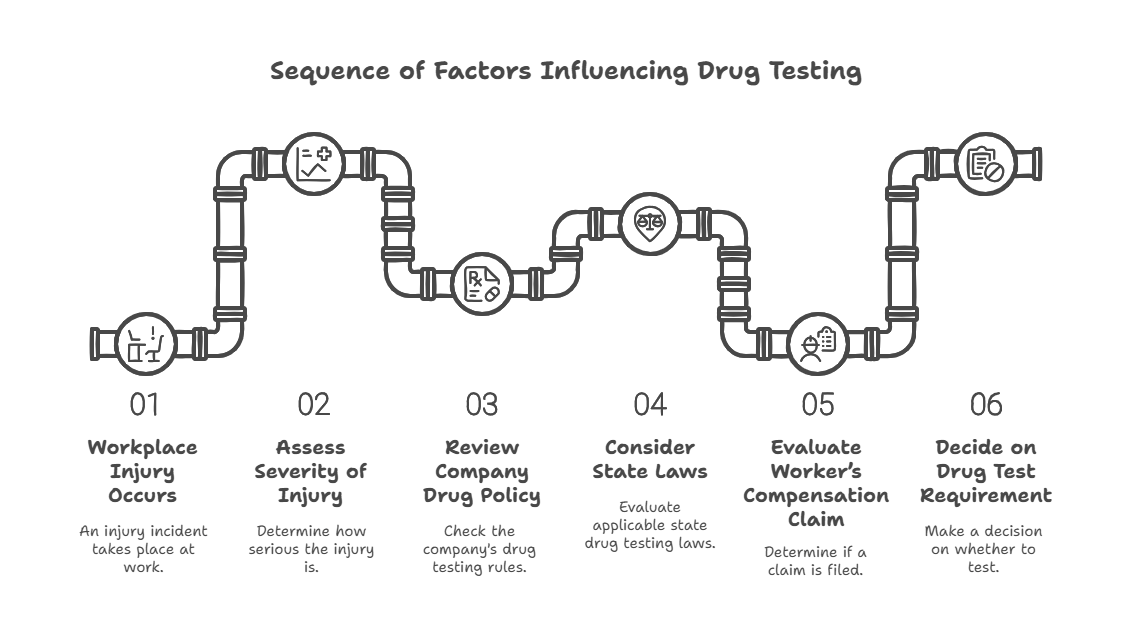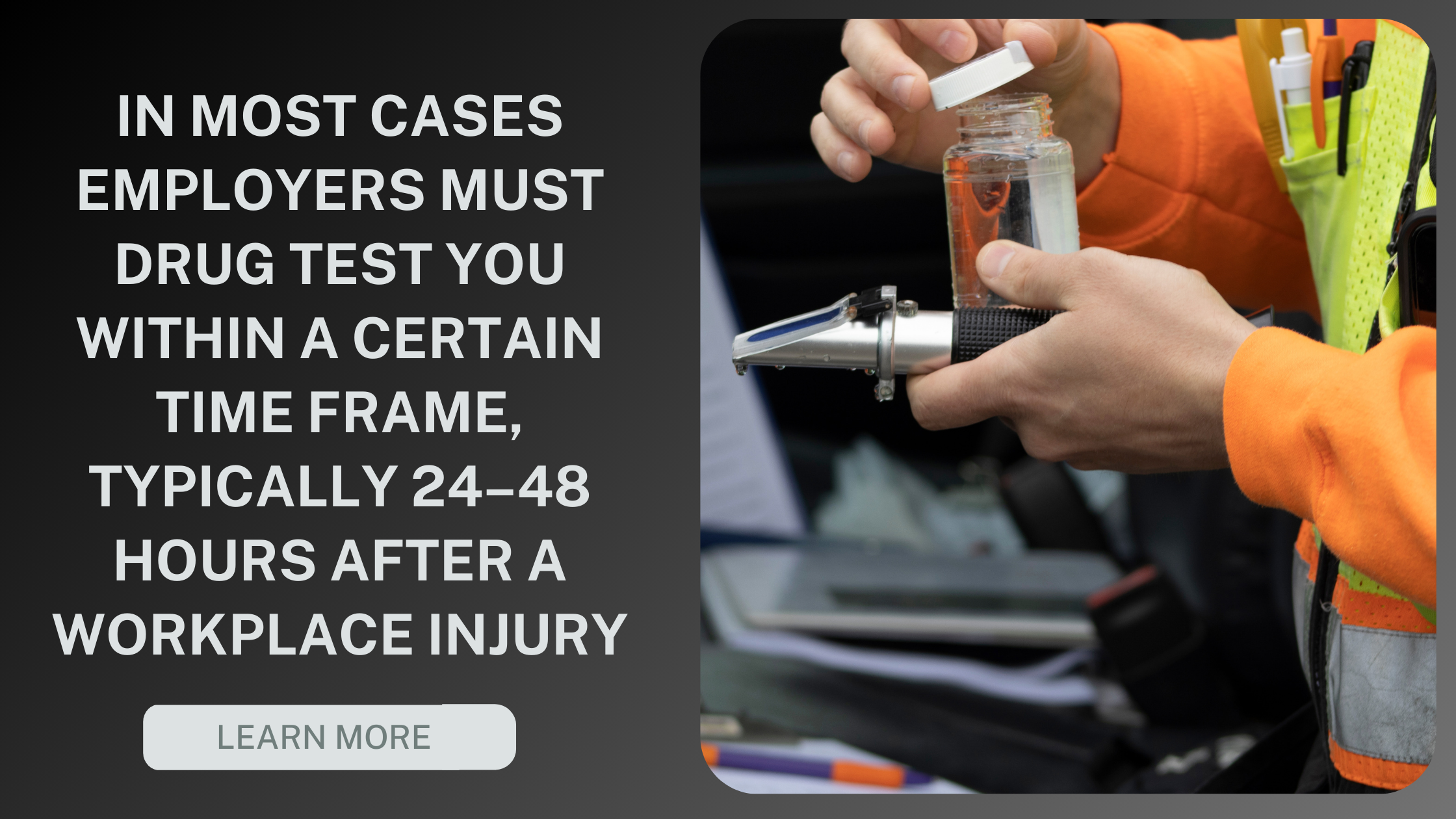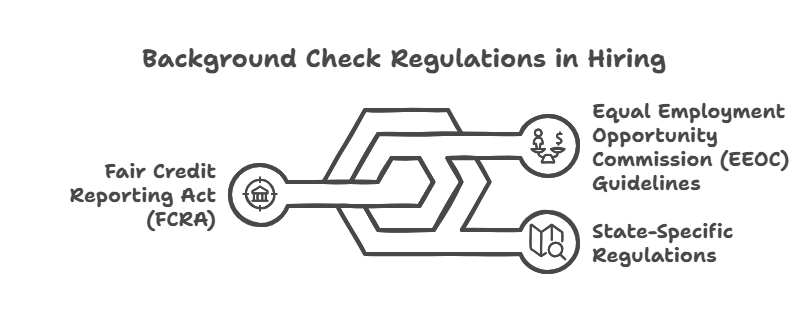What Is Workplace Drug Testing?
Workplace drug testing is the process by which an employer screens their employees for the use of illegal substances or alcohol. The goal of drug testing is to ensure that employees are working in a safe and productive environment. This is especially critical in industries where safety is a major concern, such as construction, manufacturing, transportation, and healthcare.
Drug testing typically involves screening for a variety of substances, including marijuana, cocaine, opioids, amphetamines, and alcohol. The tests can be conducted in different ways, such as through urine, saliva, blood, or hair samples. Employers implement drug testing policies to:
- Promote safety: Drug and alcohol use can impair an employee’s ability to perform tasks safely, leading to workplace accidents.
- Ensure compliance: Certain industries are legally required to maintain a drug-free workplace.
- Maintain productivity: Substance abuse can lead to poor performance, absenteeism, and increased healthcare costs.
- Protect company reputation: Employers want to ensure that their employees’ actions align with the company’s values and public image.
Some industries, particularly those regulated by the government (e.g., transportation), have stricter rules and regulations regarding drug testing. These policies aim to ensure that employees do not pose a risk to themselves or others while performing their duties.
When Can an Employer Require a Drug Test?
An employer can require a drug test in several scenarios, with the most common being:
- Pre-employment testing: To ensure that new hires are drug-free before they begin working.
- Random testing: Employees may be randomly selected for drug testing as part of a company’s regular policy to deter drug use.
- Reasonable suspicion testing: If an employer has a reasonable belief that an employee is under the influence of drugs or alcohol while at work, they may require testing.
- Post-accident testing: After a workplace injury, employers often mandate drug testing to determine if drugs or alcohol played a role in the incident. This is a common practice in high-risk industries like construction, manufacturing, and transportation.
In the case of workplace injuries, the drug testing policy is especially important. Employers have a responsibility to maintain a safe environment and ensure that substances did not contribute to the accident. Post-accident testing is particularly important for ensuring the safety and compliance of all workers.
How Long Does an Employer Have to Drug Test After an Injury?
The time frame during which an employer can legally administer a drug test after a workplace injury varies based on both federal and state-specific regulations. Employers are required to act quickly to determine whether drug or alcohol use was involved in the injury, but the exact time frame can depend on several factors.
- Federal guidelines: The Occupational Safety and Health Administration (OSHA) does not have a specific time frame for post-injury drug testing but recommends that drug tests be conducted as soon as possible after an accident. The U.S. Department of Transportation (DOT), however, mandates that post-accident drug tests must be conducted within 32 hours of an accident involving certain types of transportation workers.
- State-specific laws: Some states have stricter time limits for drug testing after a workplace injury. For example, in states like California, employers are required to conduct post-injury drug tests within 24 hours of an accident, while others may allow a longer window.
Generally, the faster the drug test is administered, the more accurate the results will be in determining whether drugs or alcohol played a role in the injury. Delaying the test can lead to unreliable results, especially if the employee has had time to metabolize the substance.
Factors That Influence Drug Testing Requirements

Several factors can impact how quickly a drug test is required after a workplace injury. These factors include:
- Severity of the injury: If the injury is severe or if there is a potential for permanent damage, an employer may prioritize a drug test to assess whether substances were involved in the incident.
- Company drug policy: Each employer has its own internal policies regarding drug testing. Some may require testing for any injury, no matter how minor, while others may limit testing to more serious incidents. Companies with high safety standards or in regulated industries are more likely to have strict testing requirements.
- State laws: Some states have laws that require drug testing after any workplace injury, while others may limit testing to incidents where the injury is more severe or where an employee is sent for medical treatment.
- Worker’s compensation claims: If an employee files a worker’s compensation claim following an injury, the insurance company may require a drug test to determine if the injury was caused by substance use. In such cases, the test is typically administered soon after the incident.
Employers must navigate these requirements carefully to ensure compliance with both state and federal regulations while also maintaining a safe and drug-free workplace. Proper understanding of the guidelines and clear communication of policies can help employers avoid legal complications and maintain a safe environment for all employees.
How Company Policies Affect Drug Testing After an Injury
Each employer has the authority to establish their own drug testing policies, which can vary significantly based on the industry, the size of the company, and the specific needs of the workplace. The internal policies set by the company play a crucial role in determining when and how drug tests are conducted following a workplace injury. Let’s take a closer look at how these policies affect post-injury drug testing.
Industry-Specific Policies for Drug Testing After an Injury
Certain industries are subject to stricter regulations and safety standards, which can directly influence drug testing policies after an injury. Employers in high-risk industries often require drug testing as soon as an employee sustains an injury, regardless of the severity of the injury.
- Construction Industry: In the construction industry, where employees operate heavy machinery and work in potentially hazardous conditions, post-accident drug testing is a common requirement. Drug testing helps ensure that employees are not impaired and that safety protocols are being followed. Companies in this sector typically require testing for any accident that causes significant injury or damage, as safety is a top priority.
- Manufacturing and Industrial Workplaces: Much like construction, manufacturing environments can pose significant physical dangers. If an injury occurs, employers often require immediate drug testing to ensure that drugs or alcohol were not factors in the accident. The presence of heavy machinery, moving parts, and high temperatures increases the need for a drug-free workplace to protect both employees and the public.
- Transportation Sector: For workers in the transportation sector (e.g., truck drivers, pilots, and train operators), post-accident drug testing is regulated by the U.S. Department of Transportation (DOT). The DOT mandates that drug tests be administered within 32 hours of an accident that involves serious injury, fatality, or significant property damage. Employers in transportation are required to adhere to these strict testing timelines to ensure the safety of everyone involved in the transport process.
- Healthcare: Healthcare facilities have their own set of challenges, particularly with regard to patient safety. In hospitals, clinics, and other healthcare settings, any accident or injury that occurs while an employee is performing their duties may prompt a drug test. Drug testing is seen as a way to protect patients, staff, and the overall integrity of the facility.
In industries where safety is a critical concern, such as construction and healthcare, post-injury drug testing can be a standard protocol, ensuring the well-being of all involved. Employers in these sectors are typically quick to act after an injury and will follow their internal policies to conduct the necessary tests.
General Workplace Drug Testing Policies
Not all industries require immediate drug testing after every injury. In lower-risk environments, such as office settings or retail, employers may have more lenient policies regarding drug testing after accidents. These employers often require testing only in specific situations, such as:
- Medical Treatment: If the employee receives medical treatment for the injury (e.g., a visit to the emergency room), a drug test may be triggered to determine if substances played a role in the accident.
- Worker’s Compensation Claims: If the employee files a worker’s compensation claim, the employer may request a drug test to confirm that the injury was not caused by drugs or alcohol. A positive result may impact the employee’s eligibility for compensation, and in some cases, a refusal to undergo testing may lead to the denial of the claim.
- Severity of the Injury: Employers may only require a drug test if the injury is deemed serious enough to warrant investigation. For example, if the injury requires an overnight hospital stay or if it involves a major fall, the employer may decide that a drug test is necessary to rule out impairment as a cause.
Employers in general office settings may choose to administer drug tests only if there is significant concern about safety or company policy violations. They often rely on their discretion, taking into account the severity of the injury and the circumstances surrounding the incident.
Can an Employer Fire You for Refusing a Drug Test After an Injury?
One of the most important aspects of company drug testing policies is the potential consequences for refusing a drug test after a workplace injury. Employers often have policies in place that outline the actions they will take if an employee refuses to take a drug test.
- At-Will Employment: In many states, employees are considered “at-will,” which means an employer can terminate an employee for any reason, as long as it does not violate the law. If an employer has a written policy that requires drug testing after a workplace injury, refusing to take the test could lead to disciplinary action, including termination.
- Refusal and Workers’ Compensation: Refusing a drug test after an injury can also have an impact on workers’ compensation claims. In some cases, a refusal to test may result in the denial of compensation benefits. Employers are generally within their rights to ask employees to undergo testing after an injury, especially if the company’s policy stipulates that it’s a requirement for all accidents.
- Consistency in Policy Enforcement: For fairness and consistency, employers should ensure that their drug testing policies are uniformly enforced. Discriminatory actions or selective testing can result in legal challenges. Companies should communicate their policies clearly and provide employees with an understanding of the potential consequences if they refuse to comply.
RapidHireSolutions and Drug Testing Services
To ensure that drug testing policies are followed correctly and to comply with legal and industry-specific regulations, many employers rely on services like RapidHireSolutions. RapidHireSolutions provides comprehensive drug screening services to businesses, assisting them in maintaining a safe, drug-free workplace. Some of the services offered by RapidHireSolutions include:
- Pre-employment Drug Testing: This ensures that all new hires meet the company’s drug-free standards before starting employment.
- Post-Injury Drug Testing: RapidHireSolutions helps employers meet their legal obligations and internal policies for drug testing after an injury, with fast and accurate results.
- Random Drug Testing: Many employers implement random drug testing programs to help deter drug use and maintain workplace safety.
- Compliance Support: RapidHireSolutions offers guidance on legal compliance and regulatory requirements for drug testing, ensuring that employers avoid potential pitfalls.
With RapidHireSolutions, businesses can streamline their drug testing processes, comply with federal and state regulations, and create a safer, more productive work environment.
Data Table of Workplace Injury and Drug Testing Timelines
| Industry | Typical Drug Testing Timeframe | State-Specific Variations |
|---|---|---|
| Construction | Immediate or within 24 hours | May vary by state regulations |
| Manufacturing | Immediate or within 24-48 hours | Dependent on company policy |
| Healthcare | Immediate or within 24-48 hours | Varies based on injury severity |
| Transportation | Within 32 hours (DOT regulated) | Mandated by federal regulations |
| Office/General | Within 24-48 hours (if applicable) | Dependent on injury severity |


